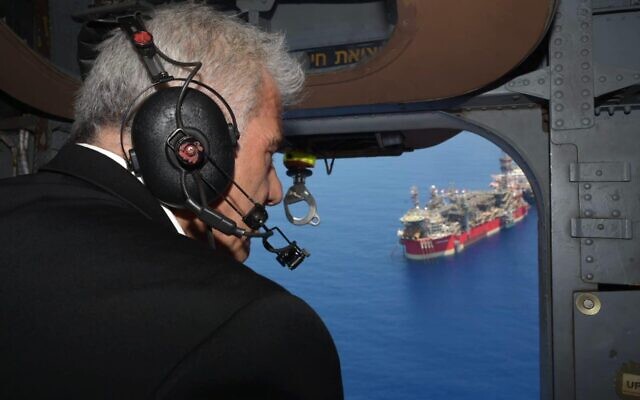The High Court of Justice ruled on Monday that the government must respond to a petition demanding that any maritime border deal with Lebanon come to a full vote in the Knesset.
The petition, filed by the right-wing Lavi organization for citizens’ rights, argues that as the current government is serving on an interim basis, after the Knesset dissolved in June, the deal must be cleared by parliament.
The petition demands that the government refrain from continuing negotiations, directly or indirectly with the Lebanese government and that they do not sign the deal without the Knesset’s approval.
The court said the government has until October 27 — four days before the general elections — to respond to the petition, when justices will hold a discussion on the deal.
The United States presented the proposal for a deal to resolve a long-running maritime border dispute to the Israeli and Lebanese governments over the weekend. Negotiations have been going on for years, and a final version of the deal is reportedly close to being signed.
Get The Times of Israel's Daily Edition by email and never miss our top stories
Though full details of the agreement have not been made public, it was greeted positively in both Jerusalem and Beirut, and even the Hezbollah terror group appeared to drop its former vehement opposition to a deal.

Prime Minister Yair Lapid flies over the Karish gas field on July 19, 2022. (Amos Ben Gershom/GPO)
According to a law passed in 2014, any plan to cede territory within the borders of the State of Israel must either be approved by the Knesset with a majority of 61 votes, and then by the public at a referendum, or passed by the legislative body by a supermajority of 80 votes.
Attorney-General Gali Baharav-Miara has yet to issue an opinion on the matter.
Prime Minister Yair Lapid has emphasized that the deal is legal, because the deal only concerns territory in Israel’s economic sphere, not territorial waters, and therefore does not require Knesset approval or a national referendum.
However, Opposition Leader Benjamin Netanyahu has labeled the deal “illegal” and accused Lapid on Monday of giving up “sovereign territory of Israel,” vowing that a potential future coalition led by him “won’t be bound by it.”
Earlier in the day, Lapid charged that the former prime minister was discussing the matter “without seeing the deal and without knowing what’s in it.”
He also accused Netanyahu of taking out his frustrations “on not reaching a deal during his 10 years in office” by sharing propaganda from Hezbollah chief Hassan Nasrallah.
A senior official argued Sunday that the “security interests of Israel are anchored in the agreement,” while serving the economic interests of the Lebanese.

Opposition Leader Benjamin Netanyahu speaks to the media in Tel Aviv on October 3, 2022. (Avshalom Sassoni/ Flash90)
A Lebanese official who attended the talks last month told The Associated Press that the proposal put forward by the US gives Lebanon the right to the Qana gas field, located partially in Israel’s domain. Israel will retain control over the Karish gas field as part of the emerging agreement.
The maritime dispute relates to some 860 square kilometers (330 square miles) of the Mediterranean Sea that include lucrative offshore gas fields.
Lebanon claims that the Karish gas field is in disputed territory, while Israel says it lies within its internationally recognized economic waters.
Lebanon hopes to unleash offshore oil and gas production as it grapples with the worst economic crisis in its modern history, plunging three-quarters of its population into poverty.
Last month, Lapid’s office vowed Israel would go ahead and extract gas from Karish with or without a deal on the maritime border with Lebanon.


